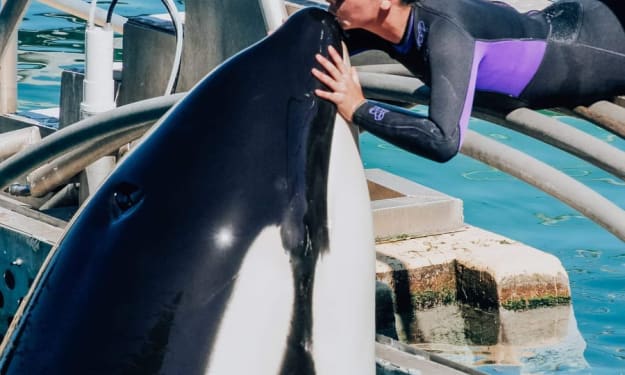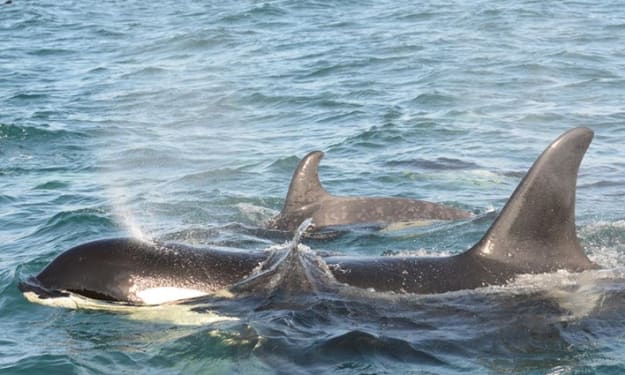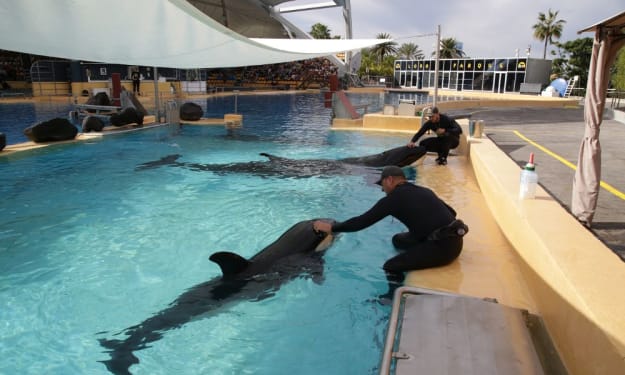
Jenna Deedy
Bio
Zoo and Aquarium Professional, Educator, Cosplayer, Writer and B.A. in Psychology whose got a lot to share when it comes to animals, zoos, aquariums, conservation, and more.
Instagram: @jennacostadeedy
Stories (137/0)
Of Whales and Man: A Reflection
It was just another hot, humid, and sunny day at SeaWorld San Antonio in August of 2010 when my counselor led our camp group to Shamu Stadium to watch an afternoon presentation of the show, Believe. Although the trainers were no longer doing any water works with the orcas at that point, they were still interacting with them during the show, and doing the regular behaviors they would often do during the show, regardless if there were waterworks, or not. After the show ended, and everyone left to see the other animals at the park, our group stayed behind at the stadium to watch baby orca Sakari interact with her mother Takara, and paternal half-sister, and “foster” aunt Unna, and talk to the trainers about their experience working with the orcas. This is where John Hargrove arrived on the scene.
By Jenna Deedy5 years ago in Petlife
Belgian Political Party Targets Zoos and Aquariums
From the outside, DierAnimal may look like any environmental-based political party that works to find methods that are aimed at improving the environment and help troubled animals. After all, any cause that is aimed at helping animals, and the planet are noble causes that we can all agree to on so many levels, However, what some supporters and zoo and aquarium professionals may now know is that DierAnimal has its very own hidden agenda that they should all need to look out for. What is that agenda you may ask? They target zoos and aquariums with the aim at “phasing” them out.
By Jenna Deedy5 years ago in Petlife
Orcas Galore: An Interview with Hazel McBride, Author of 'I Still Believe'
As a child growing up in a Scottish village, Hazel McBride dreamed of one day being able to work with killer whales. During her journey, Hazel studied psychology at Glasgow University, took part in two internships in Florida, and in the Bahamas, did some volunteering at a Scottish Zoo’s sea lion facility, and for a marine wildlife conservation survey group, and worked in both the Dominican Republic, and at Loro Parque in Spain. Anyway, against all odds, Hazel managed to fulfill her childhood dream of being able to work with killer whales as a trainer at Marineland France. However, the maelstrom of controversy that surrounds the marine zoological community has nearly drowned to a point where she decided to write about her experiences of working with marine mammals for the truth is not as black and white as the world tried to make it appear.
By Jenna Deedy5 years ago in Petlife
Fredi: A Tribute to a Rescued Pilot Whale
On Saturday, April 6th, 2019, Fredi, a short-finned pilot whale who has lived at SeaWorld Orlando since she was first rescued as a calf, died after she living under the facility’s care for eight years with a pod of pilot whales, who were also rescued as calves. In addition, she also spent those years receiving a combination of world-class care, and a second chance that she would have never received, if it had not been for the knowledge and dedication of SeaWorld’s very own rescue team, and their understanding of how to better respond to, and care for, sick, injured, and orphaned animals.
By Jenna Deedy5 years ago in Petlife
Dear San Diego, Thank You for Saving Pandas
Last week, officials at the San Diego Zoo announced that Bai Yun, a 27-year-old giant panda matriarch and her six-year-old Xiao Liwu, will return to their native China by the end of April. For more than twenty years, San Diego’s giant panda family has given zookeepers, veterinarians researchers, and guests from across the world the chance to learn about the natural history of these endangered bears in ways that were nearly impossible with wild studies in China. At the time that this article was being written, the San Diego Zoo was one of four zoos in the United States to house giant pandas.
By Jenna Deedy5 years ago in Petlife
Springer: Conservation’s Greatest Rescue Achievement
On Thursday, marine mammal researchers based at the Vancouver Aquarium announced a naming “contest” for a calf who was born to a very well known to both scientists and animal lovers alike by asking the public for ideas on what to name him. The calf, who is known as A116, is the second calf born to a Northern Resident orca named Springer, also known as A73. You see, this little internet-based event is very important to whale researchers in Canada because Springer’s own story is regarded as a great conservation achievement that many thought at the time, was considered to be impossible to pull off. However, with a little help from Vancouver Aquarium’s animal rescue team, Springer’s rescue would go on to become the first of its kind in history.
By Jenna Deedy5 years ago in Petlife
Elmwood Park Zoo Celebrates Valentine’s Day with a Wedding?
Oh, Valentine’s Day. It’s the of the year when everyone is thinking about love and how to surprise that special someone in their life whether if it’s a friend, a partner, a parent, a kid, or an adorable fur baby. This could involve bringing them to see a movie (Disclaimer: I am waiting until March to bring my parents to see Captain Marvel in theaters), taking them out for a candlelight dinner, buying them gifts, marriage proposals, and so on. However, for one zoo in Pennsylvania, Valentine’s Day was involved teaming up with a local college to celebrate their very own version of what could be described as a “royal wedding” and it was apparently too adorable for the media attention that most royal couples receive when they celebrate their unions.
By Jenna Deedy5 years ago in Petlife
Anti-Zoo Group Still Shopping for a Whale “Sanctuary” in Nova Scotia
If the Whale Sanctuary Project gets its way, then Nova Scotia could end up creating a double standard in the midst of a pending ban against the keeping of cetaceans in marine zoological facilities in Canada. The radical anti-zoo extremist group, which is led by activists Lori Marino, and Charles Vinick, plan to hold town meetings over a ten-day period to pick out a seaside town where they could shop for an area to serve as an “official” home to a beluga whale facility that would be marketed off as a “sanctuary.”
By Jenna Deedy5 years ago in Petlife
Loro Parque Shares an Update on Ula, Debunks Extremist Claims
The following piece was co-written by Maria R.Grillet. On September 22, 2018, Morgan, a 10-year-old killer whale at Loro Parque, gave birth to a healthy female calf who was later named Ula by their trainers. Although Morgan showed excellent maternal instincts towards her newborn daughter, she was not producing enough milk to provide her the necessary nutrients that she would need to thrive during the first few years of life. So, the animal care staff at Loro Parque intervened by separating them into different sections of the Open Ocean habitat to hand-rear her.
By Jenna Deedy5 years ago in Petlife
Ocean Ramsey and the Endangerment of Pregnant Sharks
On January 15th, 2018, Ocean Ramsey, a scuba shop keeper, model, shark conservation activist, and self-proclaimed marine biologist had a close encounter with a pregnant great white shark off the coast of Hawaii after she had just started feeding on the carcass of a sperm whale. As the story goes in regards to Ocean’s encounter with the 20-foot shark, Ocean, and her staff were spending the day observing tiger sharks when the animal appeared, along with a pod of dolphins that accompanied her. From there, Ocean began to swim close to her which led to the interaction between her and the shark that involved her petting the animal, and even riding on the animal’s dorsal fin. While there is no argument that Ocean had a beautiful experience with the shark, it was also a dangerous one as well.
By Jenna Deedy5 years ago in Petlife
Morgan's Calf Has Been Named: Her Name Is Ula
A killer whale calf who was born at Loro Parque last September has finally been named. According to the Spanish newspaper "El Dia," Morgan's four-month-old daughter was named "Ula," which means "Jewel of the Sea" in Celtic. However, despite this report, the staff at Loro Parque has yet to confirm it as her official name.
By Jenna Deedy5 years ago in Petlife













